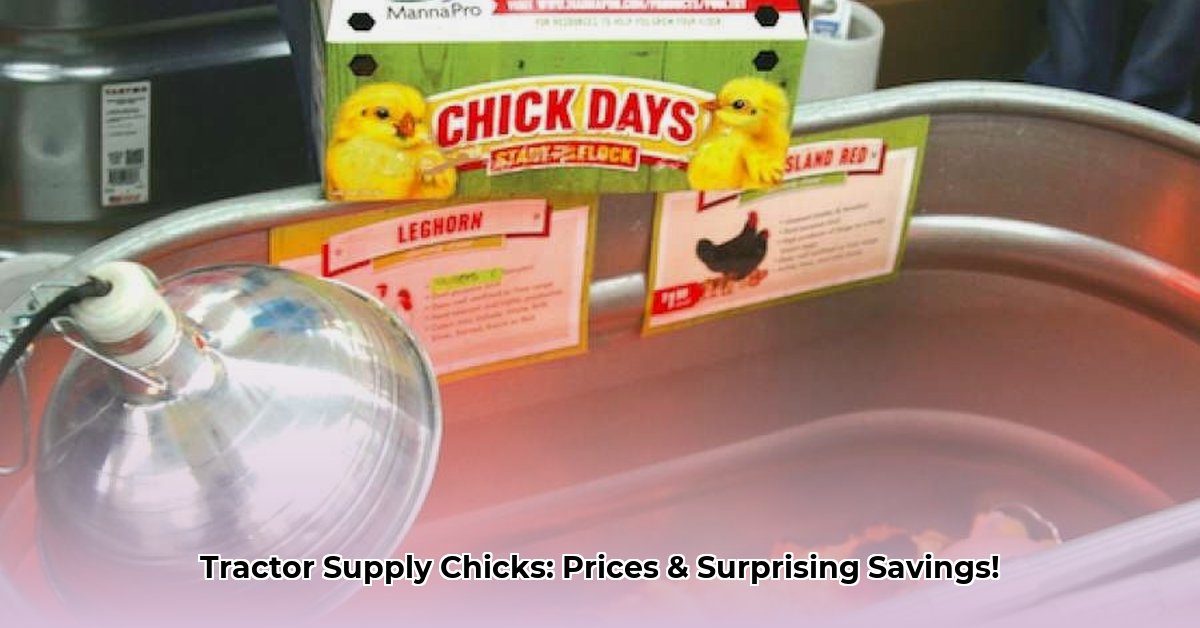
Thinking about raising chickens? It's a rewarding experience offering fresh eggs, a connection to nature, and potentially, a supplementary income stream. But before you start, you'll need to acquire your feathered friends. A common starting point is wondering: "How much does a chick cost at Tractor Supply?" For similar pricing information, you might also check out Tractor Supply poultry prices.
The price of a chick at Tractor Supply isn't fixed. It typically ranges from $3 to $10 per chick, varying based on breed, age, season, and specific store location. Popular breeds like Rhode Island Reds might be slightly more expensive than less common ones. Younger chicks are often cheaper than older ones. Seasonal price fluctuations are also common, with potential sales during specific periods. It's always best to check your local Tractor Supply store or their website for the most up-to-date pricing and availability to avoid disappointment.
Finding Your Future Flock at Tractor Supply
While Tractor Supply is a convenient place to buy chicks, their availability isn’t guaranteed. Many stores participate in "chick days," pre-arranged deliveries with a larger selection. Pre-ordering during these chick days is highly recommended to secure the breed you desire and avoid disappointment. If you miss the chick days, a limited selection might still be available, but you'll have less choice. Planning ahead is crucial for successful chick acquisition.
Beyond the Price Tag: Choosing the Right Breed
The chick's price is just the beginning. Choosing the appropriate breed is equally important for your potential success. Different breeds have varying characteristics: egg production, temperament, hardiness, and more. Consider these factors:
- Egg Production: High egg-laying breeds like Leghorns are prolific but can be more flighty.
- Temperament: Docile breeds such as Rhode Island Reds or Orpingtons are suitable for families with children.
- Hardiness: Select breeds adapted to your climate and local conditions to minimize health problems.
Before making a choice, research different breeds to find the best fit for your experience level, living situation, and goals. Consult online breed profiles or experienced chicken keepers. A well-informed decision will increase the likelihood of success regarding your chickens' welfare and productivity.
Building Your Sustainable Chicken Haven: Coop Construction
Once you've got your chicks, providing a safe and comfortable environment is paramount. A well-designed coop is crucial for your chickens' health, happiness, and productivity.
Building a Sustainable Coop:
- Size: Allow at least 4 square feet of floor space per chicken (more is better!).
- Materials: Choose durable, weather-resistant materials like wood, and consider using recycled or reclaimed materials whenever possible.
- Ventilation: Adequate ventilation prevents respiratory issues and keeps the coop dry to minimize the growth of harmful organisms.
- Predator Protection: Secure the coop entirely to prevent access by foxes, raccoons, and other predators. Reinforce weak points with sturdy materials.
- Cleaning: Design for easy cleaning access to simplify the removal of droppings and waste. Consider removable components.
Building a sustainable coop reduces your environmental impact through efficient design and the use of sustainable materials, contributing to a healthier environment for your flock.
Sustainable Chicken Feeding Practices
Feeding your chickens sustainably impacts costs and the environment. Consider these alternatives:
- Locally Sourced Grains: Reduces transportation emissions and supports local farmers.
- Organic Feed: While often more expensive, it avoids harmful pesticides and herbicides.
- Kitchen Scraps: Supplement with appropriate scraps (avoiding toxic items like onions or avocados).
Managing Waste: Composting Chicken Manure
Chicken manure is a valuable fertilizer. Composting is a sustainable method to manage it effectively:
- Layering: Alternate manure with carbon-rich materials (straw, wood chips, cardboard).
- Turning: Regular turning aerates the compost, accelerating decomposition and preventing odors.
- Drainage: Provide sufficient drainage to avoid waterlogging.
Composting transforms waste into a valuable garden resource, enriching soil and lowering your reliance on chemical fertilizers.
Making Chicken Farming Profitable and Sustainable: A Long-Term Perspective
While the initial investment in chicks from Tractor Supply and subsequent expenses is a necessary consideration, the long-term benefits of sustainable chicken farming can outweigh the costs. A well-planned operation, coupled with efficient practices, can lead to increased profitability and reduced environmental impact. Remember that consistent monitoring, disease prevention, and smart marketing strategies are essential for maximizing your success in this rewarding endeavor.
Remember to always consult your local Tractor Supply for the most up-to-date information on chick prices and availability.